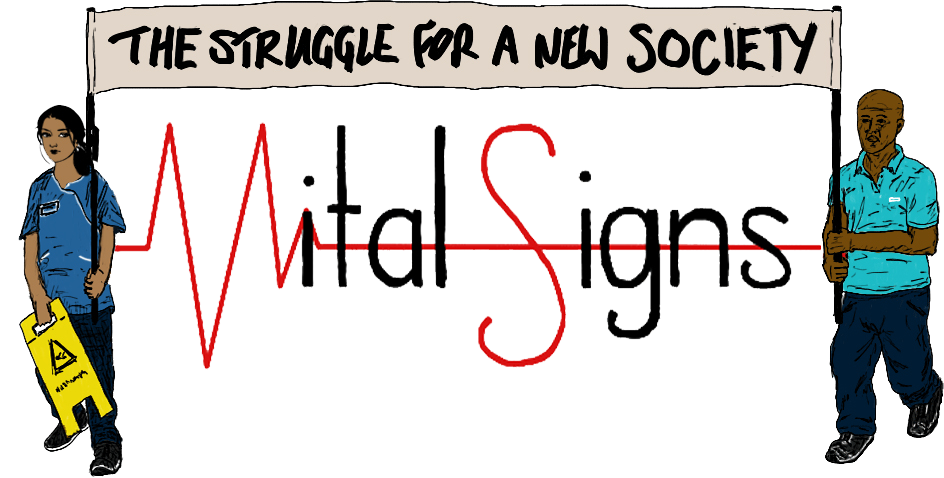This article will be circulated in Vital Signs Mag no.4, of which we distribute 1,000 copies within our two local hospitals. Feel free to help us with the print cost.
In Vital Signs no.3 we wrote about outsourcing of orthopedics theatres to private companies on weekends. Things have moved on since then. At weekends the Trust rents out theatres to the private health agency KPI. Instead of asking the Trust’s own staff they bring in a private company to operate on NHS patients. For the Trust this looks good on paper: income from the rent payment and additional surgeries to reduce the waiting list. But from a social perspective it doesn’t make sense at all. The private company gets the money back from the NHS, plus a big profit,
The surgeons, scrubs nurses, ODPs and health care assistants often don’t know each other at all and haven’t worked together before. In one case scrub nurses came all the way from Liverpool, in order to work for a weekend in Bristol. It’s not only that they don’t know each other, they also don’t know the local theatres. This is why the Trust employs a so-called link nurse, normally a local Band 6 nurse who is paid extra to be around on weekends to support the private team. Still, it is not unlikely that in emergency situations a team that is not familiar with local infrastructure would struggle to be as effective.
The employment of a link nurse at premium pay was also a way for the Trust to undermine the resistance to privatisation. It was the Band 6 nurses in particular, who had initially questioned the move to open the theatres for private business. The deal with management was that the link nurses would also prepare everything for the weekend sessions, for example the boxes with necessary disposables, such as sutures or drapes. However, because the Band 6 nurses are very busy during the week with normal NHS surgeries, it ended up being the NHS health care assistants who were actually asked to prepare things for the private business, which caused confusion and tension. Another problem is the lack of instrument sets. The Trust might decide to use disposable instruments, instead of more costly sterilised sets, which causes large amounts of extra waste. Carting nurses all the way down from Liverpool to work with one-time-use instruments just in order to show off some superficially good-looking waiting list figures – that’s what you call green sustainable hospital management. Not!
The dispute about employing private companies on weekends is not only about it being disadvantageous to local NHS staff. The bigger picture is that they want us to get used to the idea that profit is acceptable in healthcare, and that you might have to pay extra (beyond the tax that you already pay!) for health services. This basically means a significant pay cut for all workers and a money transfer to the corporations and their owners.
The private sector currently receives £12.3bn a year for treating NHS patients, according to the Department of Health and Social Care (DHSC) annual report from December 2024. The NHS payments account for nearly a third of the private health companies revenues, compared with 10% two decades ago. In 2023, private operators carried out 1.7m NHS procedures – 10% of all planned operations. Under current Labour government plans this figure is supposed to increase to 20%. Once the private sector has a certain market share it uses the fact that patients depend on it by increasing prices, e.g. the cost of undergoing a hysterectomy privately has soared by 19% from £7,385 in 2021 to £8,795 in 2023. Rich patients will be able to pay, working class patients will be made to suffer. The state is acting according to a short-term calculation: instead of investing in the NHS, they are trying to make use of already existing capacities of the private sector. Actually, the state ends up paying more and also loses experienced workers to the private sector. In the long-term this is disastrous for all of us who either work in the NHS or depend on its services.
The problem is that the state and the private companies are able to bribe NHS staff to cooperate with the process of privatisation. What, for example, about the so-called Glanso lists, which are popular both at NBT and UHBW? Glanso UK Ltd. was founded by two consultant anesthetists in Bristol in 2019. The anesthetists consultants made use of their relative monopoly and told Trusts that they would only perform extra shifts in order to cut waiting lists if they would be paid extra as a private company, rather than as NHS employees. The Trusts agreed to that blackmail and not only gave them infrastructure, but also NHS staff. In order to sweeten things with NHS scrub nurses, health care assistants and porters, these get paid on a ‘per case’ basis when working weekend Glanso lists, which often means a much higher wage compared to a normal NHS shift. These higher payments are just an initial carrot in order to get a foot in the door – in the long-run wages will be more difficult to defend once we work in a more fragmented corporate sector, compared to being employed by a large-scale employer – unless you have the privilege of having a rare qualification like a consultant anesthetist, of course.
We have to oppose the blackmail and refuse to cooperate with the process of privatisation, it will mess things up for us in the future, both as workers and as patients.




